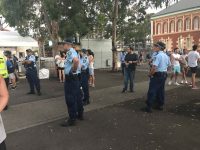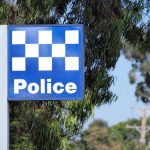Police Strip-Search 19-Year Old, Find Nothing but Kick Her Out of Festival Anyway

NSW police are continuing their war on music festivals, signified by exorbitant costs for user-pays policing, illegal strop-searches and the denial of entry to patrons even where no drugs are found after a search.
This time, their alleged victim is a 19-year-old Newcastle woman, who says she searched and found to be holding no illicit substances, but nevertheless thrown out of a Sydney Olympic Park event.
In a Facebook post last week, Lucy Moore described being stopped by an officer and told a dog had detected her despite her “never seeing the dog react or sit”. She says she was subsequently led away to be strip searched in a cubicle with the door “left half open” at the Hidden festival on 2 March.
The young woman is adamant she wasn’t intoxicated, wasn’t holding any illegal drugs, and had not been in contact with drugs in any way. She relates that after officers had “humiliated and embarrassed” her by making her remove her clothes, squat and cough, she was released into the festival.
She says that moments later, an officer told her that she had to return. And when she told a senior officer she hadn’t taken any drugs, she was told “that won’t fly here”. She describes that after holding her for over an hour, police then kicked her out of the festival and issued her with a six month ban from Olympic Park.
The reason the officer gave for kicking her out was that police thought she was intoxicated. The woman further made clear in her post that, “This war on music festivals has gone way too far as I know I wasn’t the only one treated this unfairly.”
An abuse of police powers
Strip search laws in NSW are set out in division 4 of part 4 of the Law Enforcement (Powers and Responsibilities Act) 2002 (LEPRA). Ms Moore pointed out in her post that the officers breached several of the powers set out in the legislation that govern this invasive practice.
Section 32 of the LEPRA stipulates that an officer must inform a person whether they will be required to remove their clothing and why it’s necessary to do so. And the police officer must ask for the person’s cooperation.
Ms Moore recalled that she was taken away by an officer “and was told nothing of what was about to happen”. She said she was never asked for her “consent to be searched let alone… consent to be strip searched”.
And the area in which the search itself was carried out breached police protocol as well. Section 33 of the LEPRA provides that a strip search must be conducted in a private area, and not “in the presence or view of a person who is of the opposite sex to the person being searched”.
“During my search the door was left half open and only ‘blocked’ by the small female cop,” Ms Moore explained in her post. “I could easily see outside which means that attendees and the male cops outside could have easily seen in as well.”
And she further added that another woman in the cubicle next to her was also being strip searched with the door open, which allowed for a couple of police officers to enter and leave at will during the procedure.
A flawed and intrusive practice
And while Moore’s experience is extreme, it’s hardly an anomaly under current policing practices, as strip searches have become routine. Figures released in December by NSW Greens MLC David Shoebridge show that over the last four financial years strip search use has risen by 47 percent.
Over the year 2014-15, 3,735 strip searches were carried out, while in 2017-18, 5,483 people were subjected to this practice. And not only were these people all asked to remove their clothes in front of officers, but 64 percent of these searches turned up no illegal items or substances.
The release of these figures followed on the announcement in October that the state’s sole police watchdog the Law Enforcement Conduct Commission was conducting an investigation into allegations that some officers had been abusing strip search powers.
While in November, Aboriginal Legal Service Western NSW deputy principal solicitor Emily Winborne revealed that police officers had been searching Aboriginal children as young as 11 years old. And in some cases, strip searches are being conducted illegally.
Curbing the rise in strip searches
In mid-December, the Redfern Legal Centre launched the Safe and Sound campaign, which is aimed at reducing the high number of strip searches police are carrying out. It also plans to have the laws changed, so that officers have more guidance and the public is better safeguarded.
Head of police accountability practice at the centre Samantha Lee told Sydney Criminal Lawyers in January that “there’s no particular area where a strip search isn’t occurring across NSW”. She added that most concerning were stories of young Aboriginal kids being strip searched.
Not holding, but banned anyway
And neither was Moore’s barring from the event and subsequent six month ban from Olympic Park exceptional. Indeed, it’s in keeping with a policy that police began last May, when officers started denying patrons entry into festivals after a dog gives a positive indication, regardless of whether drugs are found.
At the Above and Beyond festival at Olympic Park last June, at least five festivalgoers were sent away following a false positive indication from a sniffer dog. And not only were they barred, but they were banned from the whole Olympic precinct for six months.
To be internally investigated
Ms Moore said that she and her family had decided to take the matter further and they were going to get in contact with the NSW Police Force to make a formal complaint. And she urged anyone else who’d suffered similar treatment to do the same.
A spokesperson for NSW police told the Sydney Morning Herald that “after receiving a complaint, this matter will now be subject to an internal review and it would therefore be inappropriate to comment further.”
And Ms Moore stressed that she knows that some of her friends had only been patted down and then allowed into the festival, so she’s aware there are still “good cops” out there. Although, she concluded that “some cops are abusing their powers at these festivals and we can’t stand for it”.







